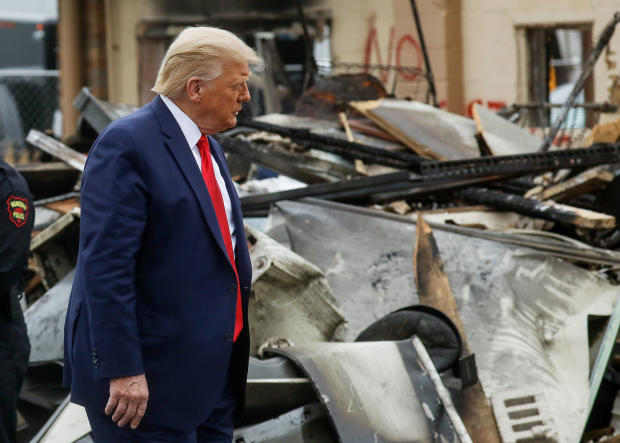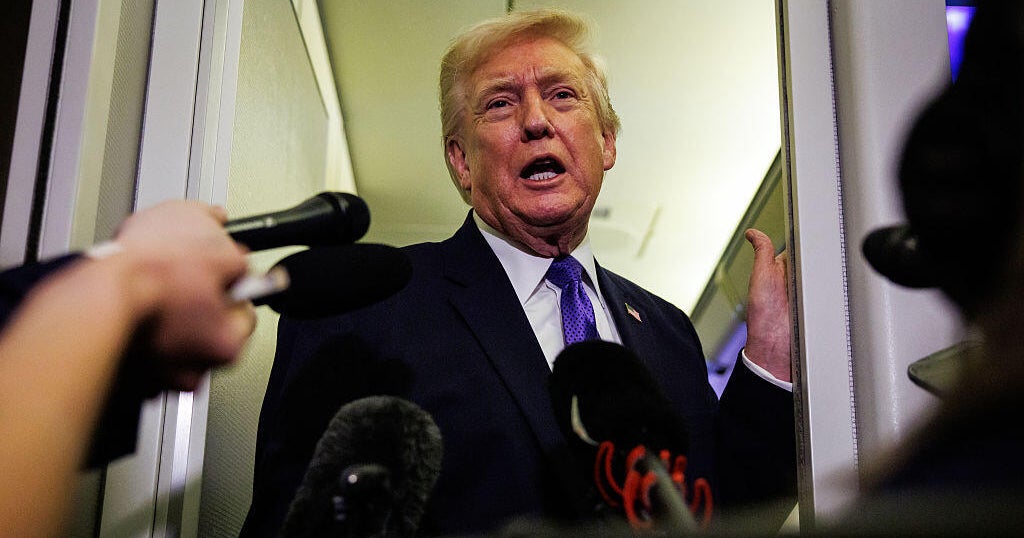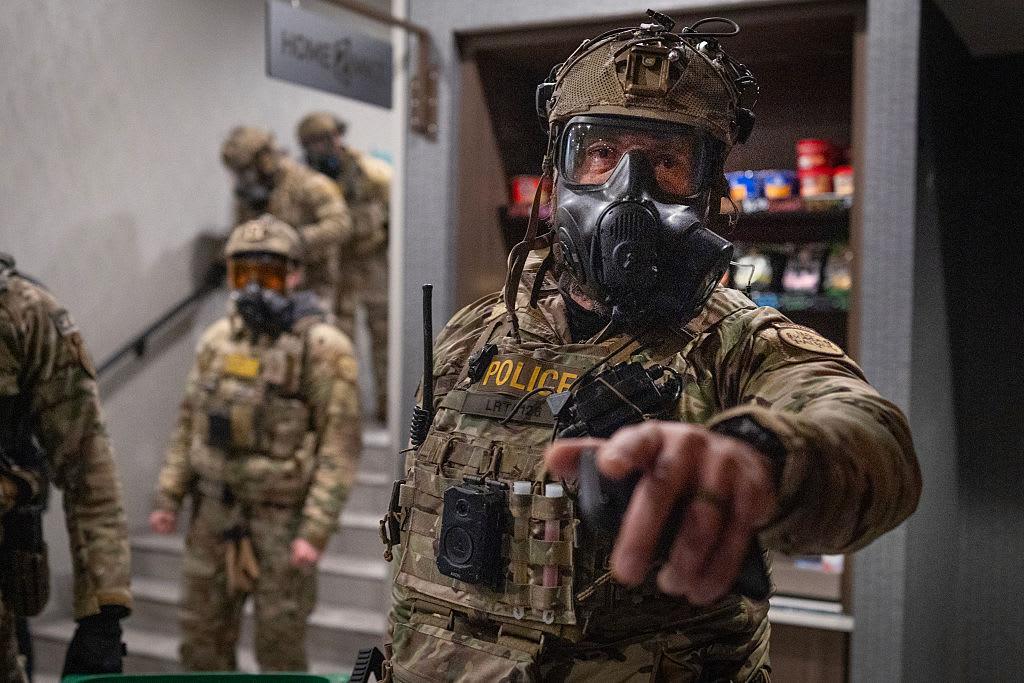Trump surveys damage in Kenosha, visiting over objections of local leaders
President Trump traveled to Kenosha, Wisconsin, on Tuesday to survey buildings damaged in recent protests and express support for law enforcement, visiting the city nine days after a police officer shot Jacob Blake, a Black man, seven times in the back.
Under heavy security, the president toured the damage alongside Attorney General William Barr and Acting Homeland Security Secretary Chad Wolf, telling reporters that "we're going to get it fixed up." Mr. Trump also participated in a roundtable and visited an "emergency operations center" at a local high school.
The president's trip came over objections from local leaders who have raised concerns that the president's appearance may further escalate tensions in the city, which has been roiled by protests since the Blake shooting and the deaths of two people by a suspected vigilante shooter at a subsequent demonstration.
Mr. Trump was not scheduled to meet with members of Blake's family, who have been vocal in denouncing violent protests since Jacob Blake was shot on August 23. The 29-year-old father of six remains hospitalized and is paralyzed from his injuries, his family lawyers have said.
Members of the Blake family and hundreds of demonstrators appeared at a community rally coinciding with Mr. Trump's visit, calling for justice at the site of the shooting. The Reverend Jesse Jackson, a leader of the civil rights movement for decades, spoke at the peaceful gathering.
At the roundtable event, the president, flanked by Barr and Wolf, reiterated his support for police and condemned "reckless politicians [who] continue to push the destructive message that our nation and our law enforcement are oppressive or racist."
"We have to condemn the dangerous anti-police rhetoric," Mr. Trump said. He said police officers involved in high-profile cases of misconduct are often "under tremendous pressure" and have "a quarter of a second to make a decision."
"And if they make the wrong decision, one way or another, they're either dead or they're in big trouble," the president added. "And people have to understand that. They choke sometimes."
Mr. Trump also acknowledged that some local officials urged him to postpone his visit.
"Some people thought it would be a good thing for me to come, a bad thing, I just wanted to come. I really came today to thank law enforcement," Mr. Trump said. The president and Barr also announced $41 million in grant awards to Wisconsin and local jurisdictions within the state to address recent unrest.
Mr. Trump repeatedly refused to answer whether there is a problem with systemic racism in the country, and denied that many of the nationwide protests against racial violence have been peaceful.
"You just keep getting back to the opposite subject. We should talk about the kind of violence that we've seen in Portland and here and other places. It's tremendous violence," Mr. Trump said, referring to recent unrest in Portland, Oregon. He also said that people who aren't protesting "want to see law and order."
"You don't see them marching and you don't see them on the streets. But what they want is — they want great police force," Mr. Trump said.
The president said at the roundtable that he felt "terribly" for Blake and his family.
"I feel terribly for anybody that goes through that," Mr. Trump said.
In an interview with Fox News anchor Laura Ingraham that aired Monday evening, Mr. Trump compared police officers shooting people in custody to golfers who "miss a three-foot putt."
"They choke. Just like in a golf tournament, they miss a three-foot putt," Mr. Trump said.
Wisconsin Governor Tony Evers, a Democrat, had asked Mr. Trump to "reconsider" his visit to Kenosha in a letter on Sunday.
"I, along with other community leaders who have reached out, are concerned about what your presence will mean for Kenosha and our state," Evers wrote. "I am concerned your presence will only hinder our healing. I am concerned your presence will only delay our work to overcome division and move forward together."
Kenosha Mayor John Antaramian, also a Democrat, told CNN on Monday that Mr. Trump's visit comes at "the wrong time."
"Our community has gone through a great deal and there is no time right now for politics to be played. We would prefer the President had waited at least another week or so before coming to visit," Antaramian said.
The president's visit on Tuesday came after he declined to denounce Kyle Rittenhouse, the 17-year-old White gunman charged with killing two people last week during a tumultuous night of protests. At a White House briefing on Monday, Mr. Trump suggested that Rittenhouse was acting in self-defense, and "probably would have been killed" had he not fatally shot two protesters. When asked if he agreed with armed vigilantes taking to the streets, Mr. Trump said he would "like to see law enforcement take care of everything."
Wisconsin, which Mr. Trump narrowly won in 2016, is also a critical swing state in the upcoming election. A CBS News poll in August showed Democratic nominee Joe Biden leading in Wisconsin and Pennsylvania.
Biden delivered a speech on Monday condemning the violence across American cities and blaming Mr. Trump for fanning the flames.
"Fires are burning and we have a president who fans the flames, rather than fighting the flames," Biden said. "Does anyone believe there will be less violence in America if Donald Trump is reelected?




